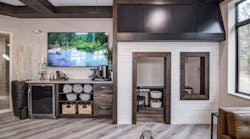Jessica Martin, EdS, MS, BS
Dental anxiety has always been a barrier to care for our patients. Research estimates that at least 70% of the population struggles with dental anxiety to some degree.1 Receiving dental care amidst a pandemic makes this even more challenging for dental providers.
Patient comfort can go a long way toward encouraging patients to accept care. First, ensure that they have a solid understanding of why it is safe to be treated at your office, in spite of COVID-19. It can be helpful to write a script for your team to use when communicating with patients about office safety during the pandemic. Your team should be able to reference the Centers for Disease Control and Prevention and the American Dental Association guidelines to let patients know that your office is on the cutting edge of these recommendations. Having a script gives team members confidence to communicate your safety measures while providing a consistent message for patients.
A simple strategy to decrease dental anxiety is to determine when a patient is feeling anxious. This can be accomplished with an intake questionnaire that asks about someone’s previous dental experiences, and their feelings about receiving dentistry. This can also be noted during the initial phone conversation, observed nonverbally from the patient during check-in, or while they’re seated in your chair. Training the team in identifying nonverbal indicators of dental anxiety is the first step toward being able to effectively reduce the anxious feelings. Just acknowledging how a patient feels can help the person feel calmer.2
Once it is determined that someone is struggling with anxious feelings, active listening will help the person feel understood and cared for. Identifying what aspects of the dental experience create the largest triggers for a patient allows the team to work around the triggers. Offering comfort items such as blankets, pillows, entertainment, fidgets, and pampering goes a long way toward creating a calm atmosphere during care.
There are also some simple alterations you can make to your office to create an overall relaxing atmosphere. Reduce clutter wherever possible and be aware of the color scheme of your office. Neutral, natural browns, grays, and creams contribute to a less clinical feel. Choosing colors in the same paint swatch creates the most cohesive look.
Incorporate battery-operated candles into the décor and use lamps and warm lighting when possible. Music can also have a calming impact. Allowing patients to choose what they listen to while in the dental chair is ideal but in common spaces, playing classical or meditation music can be a great way to set a calm mood. Plants and greenery, real or faux, also provide calm because aspects of nature in the décor helps patients feel calmer.3
We do better when we know better. Addressing the anxiety some of your patients deal with can not only help them have a more positive dental experience, it will also keep your schedule full and assist with treatment plan acceptance. Everyone wins when we serve people in better ways.
References
1. Foley KE. So many people are afraid of going to the dentist psychologists don’t know how to quantify it. Quartz.com. March 8, 2017. Accessed March 25, 2020. https://qz.com/926892/so-many-people-are-afraid-of-going-to-the-dentist-psychologists-dont-know-how-to-quantify-it/
2. McGuire J. How to help someone with anxiety. Hopkins Medicine. Accessed February 9, 2021. https://www.hopkinsmedicine.org/health/treatment-tests-and-therapies/how-to-help-someone-with-anxiety
3. Doheny K. The calming power of nature. Everyday health. June 15, 2018. Accessed February 3, 2021. https://www.everydayhealth.com/news/calming-power-nature/
Jessica Martin, EdS, MS, BS, has more than 12 years of consulting experience and is on a mission to improve dentistry for patients and practice owners. She and her husband, Tony Martin, DDS, own a successful dental practice in Altoona, Wisconsin. Jessica also owns and operates Martin Management, a dental spa consulting business that trains teams how to effectively address dental anxiety with systems that are proven to reduce sensory overstimulation.





